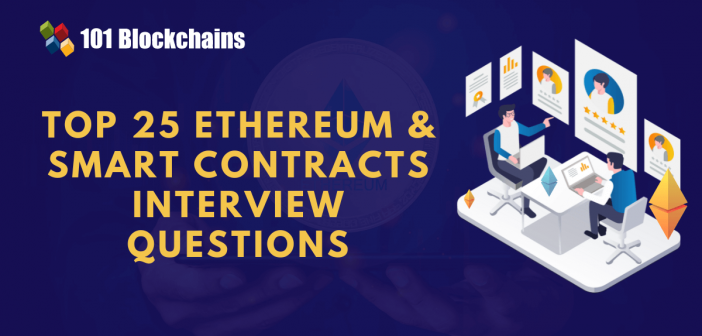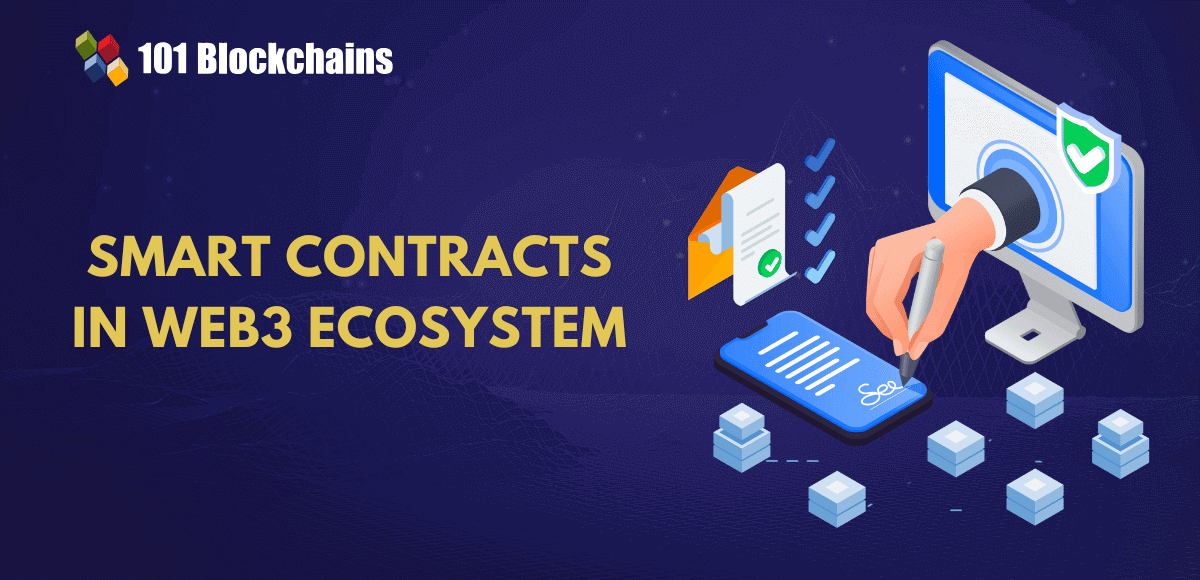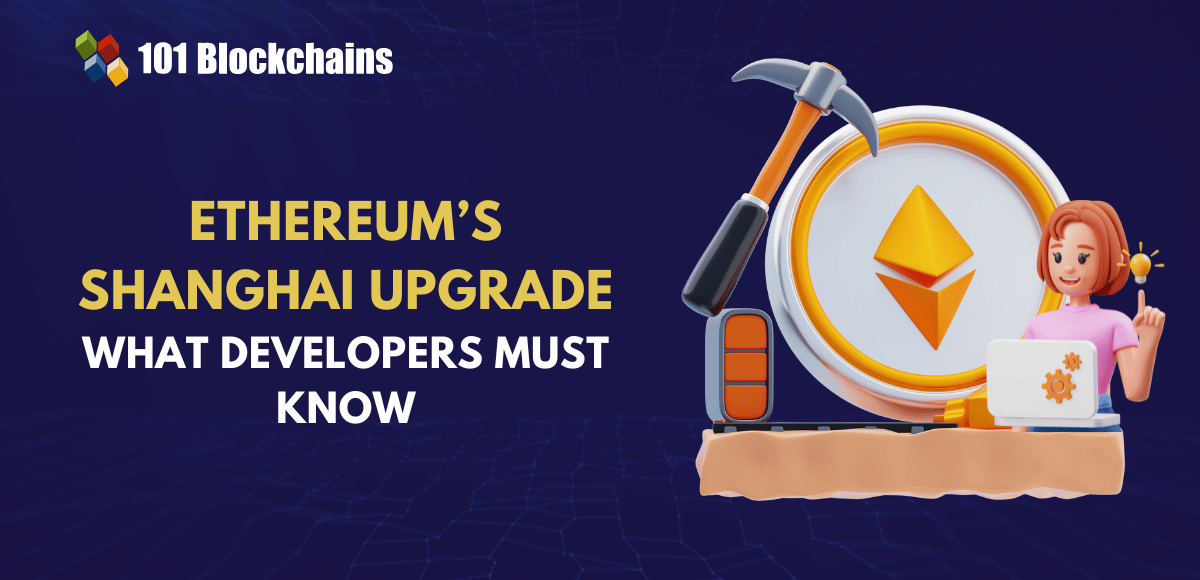Learn how blockchain truly works, master key definitions, and uncover what makes smart contracts so "smart." Dive into the fundamentals, gain valuable insights, and start your blockchain journey today!

- Ethereum
Georgia Weston
- on February 17, 2023
Top 25 Ethereum & Smart Contracts Interview Questions
Ethereum and smart contracts are the most important terms in the blockchain and web3 landscape. The Ethereum blockchain has over 44 million smart contracts deployed on the platform, with the potential for addressing many other new use cases. It would be best if you learned Ethereum & smart contracts interview questions to improve your chances of landing lucrative jobs as an Ethereum or smart contracts expert.
The popularity of Ethereum is evident in recent reports suggesting around 338% more Ethereum transactions than the Bitcoin blockchain. The average daily transactions for ETH amount to almost 1.1 million, while Bitcoin manages around 255,000 transactions. Furthermore, the growing demand for Ethereum experts and smart contract developers is a viable reason for learning about Ethereum and smart contract development. The following discussion helps you learn some important questions and answers about Ethereum and smart contracts, which can help you prepare for interviews.
Excited to build your skill in Ethereum development by leveraging the ethers.js library? Enroll Now in Ethers.Js Blockchain Developer Course!
Why Should You Learn about Ethereum and Smart Contracts?
The thriving web3 ecosystem is one of the first reasons to prepare for smart contract careers and make the most of career opportunities in different roles. Whether you want to become a smart contract developer, DeFi developer or solution architect, Ethereum and smart contracts are the primary areas you must cover to achieve desired skills and knowledge.
Ethereum is the foundation blockchain, which introduced the concept of smart contracts with its Solidity programming language. Now, Ethereum is the biggest platform for designing, creating, deploying and maintaining smart contracts for different use cases. The sheer variety of use cases for Ethereum and smart contracts validates the reasons for learning about them.
Curious to understand the complete smart contract development lifecycle? Enroll in Smart Contracts Development Course Now!
-
Popularity of Ethereum
As of July 2022, the total number of smart contracts deployed on Ethereum reached 1.45 million. The scope for a career as a smart contract developer with Ethereum expertise is also evident in the number of daily active users on Ethereum. Interestingly, the average daily active addresses on Ethereum is around 420,000, thriving due to the demand for NFTs and DeFi. It is important to note that the popular NFT marketplace, OpenSea, has the address with the highest activity on the Ethereum blockchain. At the same time, Ethereum has captured around 63% of the DeFi market. Ethereum blockchain also hosts more than 3000 decentralized applications for varying use cases.
-
Career Prospects for Future
The interest in questions about smart contracts and Ethereum has grown substantially on the grounds of promises for web3 careers. The average annual salary for Ethereum experts ranges between $70,000 and $250,000, depending on experience and job responsibilities. The career prospects for Ethereum and smart contract professionals could also diversify in the future with options for exploring other roles. Developments in the field of the metaverse and other web3 use cases, such as utility-based NFTs, could open up new roads for career development. Professionals specializing in smart contracts and Ethereum could capitalize on these career development opportunities and achieve lucrative returns.
Most Popular Ethereum and Smart Contract Interview Questions
The interrelationship between Ethereum and smart contracts makes it easier for candidates to prepare for interview questions on both topics. You can find connections between a smart contracts interview question and important concepts in Ethereum. Let us look at the important questions about Ethereum and smart contracts that can help you in an interview.
Fundamental Ethereum and Smart Contracts Interview Questions
The recommended course of preparations for smart contract careers begins with awareness of basic questions about Ethereum and smart contracts. Here is a list of the fundamental-level questions you can expect in interviews for testing your Ethereum and smart contract knowledge.
Excited to learn the basic and advanced concepts of ethereum technology? Enroll Now in The Complete Ethereum Technology Course
1. Can you describe Ethereum?
The foremost addition in basic Ethereum interview questions would focus on its definition. Ethereum is a popular blockchain network with an embedded virtual machine or Ethereum Virtual Machine. It offers an ideal platform for developing apps and digital organizations or communities with a decentralized, censorship-resistant, permissionless infrastructure.
2. What is the importance of EVM in Ethereum?
Ethereum Virtual Machine or EVM is a single computer or virtual machine accessible to all nodes in the Ethereum blockchain network. All the nodes in the Ethereum network maintain a copy of the EVM state. In addition, participants could broadcast requests for performing arbitrary computations on the EVM. Upon broadcasting the requests for transactions, other participants in the Ethereum network would verify, validate and execute the transaction. Finally, the EVM would register the changes and circulate the updated copy throughout the Ethereum blockchain network.
3. How is Ether used in the Ethereum blockchain?
The collection of Ethereum questions and answers in interviews could also evaluate your knowledge of the applications of Ether or ETH. Ether is the native cryptocurrency in Ethereum, which serves as a viable market for facilitating computation. The market could enable economic incentives for the efforts of participants in the verification and execution of transaction requests alongside providing computational resources. Ether is an integral factor for ensuring crypto-economic security in the Ethereum blockchain network.
Want to become a Cryptocurrency expert? Enroll Now in Cryptocurrency Fundamentals Course
4. What is a smart contract?
You should also expect a smart contracts interview question on the definition of the smart contract. Ethereum blockchain participants do not have to write code from scratch for every interaction with EVM. On the contrary, smart contracts provide automated transaction execution according to desired parameters of parties involved in transactions. Smart contracts are codes with specific parameters and pre-defined actions or computation processes executed upon compliance with distinct conditions of the transactions.
5. What is a transaction request?
The transaction request is a legal term assigned to the process of users requesting the execution of code on EVM. On the other hand, a transaction is a completed transaction request featuring the relevant update in the state of EVM. All users could broadcast transaction requests from a node. Some examples of transactions include publishing smart contract code on EVM state or sending ETH to another account.
6. How many types of ETH denominations do you know?
The basic questions for an aspiring smart contract developer on Ethereum would also emphasize the denominations of ETH. Ethereum blockchain also serves as the ideal place for performing many small transactions. Therefore, smaller denominations of ETH could support such transactions. The two most common denominations of ETH are Wei and gwei, which are suitable for different uses. Wei is useful for the calculation of ETH required for technical implementations. On the other hand, we could offer accessible gas fees for transactions on the Ethereum blockchain.
7. What is the recommended method for checking the ETH balance?
You can query for Ether balance in any account by verifying the ‘balance’ field of the concerned account. The answers to such Ethereum & smart contracts interview questions would also point at tools like Etherscan. It is a web-based blockchain explorer application that can help check address balances. You can also rely on direct requests to nodes or use wallets for checking ETH balance.
8. Can you describe a decentralized application?
Decentralized applications are also a prominent highlight in the common Ethereum questions and answers for interviews. Decentralized apps are applications developed on a decentralized network by combining a frontend user interface and smart contract programmability. Some of the other important traits of dApps show that they are isolated, deterministic and Turing complete. Decentralized apps run on EVM and do not affect the normal working of the Ethereum blockchain and could perform the same function in different environments. In addition, Turing complete nature of dApps ensures that they can perform any action with desired resources.
9. How are decentralized applications helpful for users?
Decentralized applications introduce various advantages, including censorship resistance, zero downtime, and comprehensive data integrity. The interview questions about smart contracts emphasize on dApps owing to the use of smart contracts in dApp development. Decentralized applications assure zero downtime alongside the trustless execution of transactions alongside ensuring user privacy.
Are you planning to become a certified professional with accredited certifications? It’s time to level up your career with 101 Blockchains CPD accredited certification programs.
10. What are the challenges in dApp development?
The interview questions for Ethereum and smart contract experts would also draw attention to challenges in developing dApps. You can answer such basic Ethereum interview questions by highlighting network congestion, maintenance, and performance overheads. In addition, the development of user-friendly interfaces and experiences, alongside avoiding the possibilities of centralization, also affects app development.
11. Which languages are used commonly for smart contract development?
The most striking aspect of Ethereum refers to the flexibility of developing smart contracts with developer-friendly programming languages. For smart contract programming, you can rely on popular choices such as Solidity or Vyper. Some experienced developers also prefer Yul or Yul+. Emerging smart contract programming languages such as Fe are prominent contenders for developing smart contracts.
12. How can smart contracts serve real-world use cases?
Candidates aspiring for careers in Ethereum and smart contracts can expect questions like “What are the three major benefits of smart contracts?” to prove their fundamental knowledge of smart contracts. The three prominent benefits of smart contracts include autonomy, accuracy, and security of transactions. Based on these benefits, smart contracts can find applications in different use cases, such as crowdfunding, voting systems or decentralized exchanges, and other DeFi applications.
Want to learn and understand the scope and purpose of DeFi? Enroll Now in Introduction to DeFi- Decentralized Finance Course
13. What are the important traits of Solidity for smart contract development?
The fundamental questions on Ethereum and smart contracts could also test your knowledge regarding Solidity. Solidity is a high-level contract-oriented smart contract programming language. The support for inheritance helps extend other contracts, while libraries can help create reusable code.
14. How is Vyper a suitable alternative to Solidity for smart contract programming?
Vyper is a trusted alternative to Solidity for smart contract programming with features such as efficient bytecode generation and strong typing. You can answer such smart contracts interview questions by specifying how Vyper features similarities to Python. Vyper also offers smaller compiler code, which is easy to understand. The limited assortment of features on Vyper ensures that smart contracts are more secure and offer flexibility for audits.
15. Are Yul and Yul+ reliable for smart contract programming?
The interview questions for smart contract careers can also emphasize intermediate-level languages for experts like Yul and Yul+. The most noticeable benefit of Yul for smart contract programming is the assurance of a simple and functional low-level language. It also ensures adequate facilities for optimizing gas usage in smart contracts.
Want to learn the basic and advanced concepts of Ethereum? Enroll in our Ethereum Development Fundamentals Course right away!
Technical Ethereum and Smart Contract Interview Questions
Preparing for smart contract developer jobs requires candidates to learn technical interview questions. Here are some advanced questions about Ethereum and smart contracts you may encounter in an interview.
16. Which types of accounts can you find in Ethereum?
An Ethereum account is any entity with an ETH balance and the capabilities for sending transaction requests on Ethereum. You can find user-controlled accounts or smart contract-enabled accounts. Externally-owned accounts are accounts that involve another individual controlling them with private keys. In the case of contract accounts, you have a smart contract code controlling the account.
17. What are the important fields in Ethereum accounts?
The technical Ethereum questions and answers also emphasize details about fields in Ethereum accounts. You can find four fields in Ethereum accounts: nonce, balance, code has and storage root. The nonce serves as a counter for indicating the number of transactions from the account, while the balance indicates the ETH balance on the concerned account. The codeHash is an encrypted representation of the account on EVM, and the storage room is the 256-bit storage hash.
18. Do you know about the components of a smart contract?
The list of advanced Ethereum & smart contracts interview questions would test your knowledge of smart contract components. Smart contracts have components such as data, functions and events and logs. Out of which, data components could include storage data, memory data and environment variables. Smart contracts could have internal, external, public or private function calls. The events help communicate with the smart contract, while logs can document the transactions.
Curious to know how to build your expertise in Ethereum technology? Check the detailed guide Now on How To Advance Your Ethereum Skills?
19. How is a smart contract library useful?
Smart contract developers must note that they don’t have to create smart contracts from scratch. Libraries could help add smart contract functionalities for any project with reusable code. The smart contract library includes specifications about the code’s behaviour and standards for interoperability and composability. One of the significant benefits of smart contract libraries is security assurance, with comprehensive scrutiny for open-source libraries.
20. What are the recommended methods for testing smart contracts?
The next important smart contracts interview question among technical questions regarding Ethereum and smart contracts focuses on testing. Smart contract testing is the in-depth analysis and review of smart contracts to evaluate source code quality. The common methods recommended for testing smart contracts include automated and manual testing.
21. Do you know the specific methods for automated and manual testing of smart contracts?
The questions about smart contracts will also test your technical expertise regarding particular methods in automated and manual smart contract testing. Automated testing of smart contracts can rely on functional testing methods such as system testing, unit testing and integration testing. In addition, automated testing also uses static and dynamic analysis methods. On the other hand, manual testing approaches include code audits or bug bounties.
Want to know the real-world examples of smart contracts and understand how you can use it for your business? Check the presentation Now on Examples Of Smart Contracts
22. What are the mandatory prerequisites for deploying smart contracts?
The mandatory requirements for deploying smart contracts include ETH for gas and the contract’s bytecode. It is important to note that contract deployment would require more gas than a basic ETH transfer. Another important requirement for deploying smart contracts is a deployment script or plugin. You must also have access to a public node, your node or nodes by node service providers.
23. What is EIP-1559?
EIP-1559 could also be a mandatory highlight in smart contract developer interview questions. The EIP-1559 upgrade has been introduced with the London Upgrade of Ethereum and enables a complex transaction fee mechanism. However, it also provides the advantage of predictability in gas fees, thereby ensuring better efficiency in the transaction fee market.
24. How can you reduce gas costs for smart contracts?
Smart contract developers must also clearly understand the strategies for reducing gas costs. The foremost recommended strategy for controlling gas costs involves setting an indicator of priority level for the transactions. You can monitor gas prices and transfer ETH with lesser gas costs with the help of tools such as Etherscan, ETH Gas Station or Blocknative ETH Gas Estimator.
25. What are the steps involved in smart contract verification?
Smart contract verification is different from testing. You can answer such Ethereum & smart contracts interview questions by referring to recommended steps in verification. The first step involves the input of source files and compilation settings in a compiler which generates the contract bytecode. You must now obtain the contract’s bytecode deployed at the concerned address. In the next step, you must compare recompiled bytecode with the deployed bytecode. Upon matching the bytecode, the contract verification is complete.
Aspiring to become an Ethereum developer? Read here detailed guide on How To Become An Ethereum Developer now!
Bottom Line
Ethereum and smart contracts serve as integral highlights in the existing blockchain ecosystem. They are also powerful entities for the future of web3 technologies. The detailed outline of basic Ethereum interview questions and technical questions regarding smart contract development can help you with interviews.
Therefore, you need to move beyond questions like “What are the three major benefits of a smart contract?” and find deeper insights into Ethereum and smart contracts. Starting from the anatomy of smart contracts to the components of the Ethereum blockchain, you need to cover multiple areas of knowledge for web3 careers. Learn more about Ethereum technology and smart contract development with professional training courses.
*Disclaimer: The article should not be taken as, and is not intended to provide any investment advice. Claims made in this article do not constitute investment advice and should not be taken as such. 101 Blockchains shall not be responsible for any loss sustained by any person who relies on this article. Do your own research!






